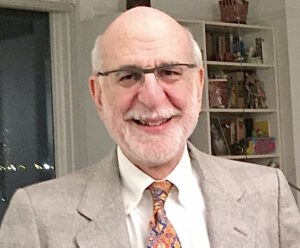New Developments in Neuroscience and Psychoanalysis – Eric Marcus
The exteroceptive sensory system and symbolic representations – Notes on phenomenology and neurophysiology
New Developments in Neuroscience and Psychoanalysis Series
This exciting online series hosted by the Neuropsychoanalysis Association showcases the cutting-edge knowledge that is currently emanating from neuroscientific disciplines and the field of psychoanalysis. The series includes presentations from leading authorities that will enhance neuropsychoanalytic understanding, while at the same time inspire our multidisciplinary community. The series will demonstrate the amazing variety of topics that are relevant to the fascinating field of neuropsychoanalysis.
Friday, December 16
11:00 a.m. – 1 p.m. (Eastern Standard Time)
Click here to view the recording of this event.
Start time in selected time zones
The webinar will be 2 hours long.
This talk will describe the role of the exteroceptive sensory system in organizing human symbolic representations. A sensory-emotional system will be described, functioning as a condensation of both sensory and emotional modalities and contents. Thing presentations in particular, with their condensations of percept, affect and concept, and symbolic alterations of reality in general, will be illustrative. Symbolic alterations of the body, as in human sexual experience in particular, and in psychosomatic experience in general, involve both the exteroceptive and interoceptive systems. Both are experienced as peripheral. Peripheral sensory modalities in humans have unique information processing characteristics. They are sensitive, qualitative, meaning making analog processors, particularly valuable for adaptation. They also have a crucial role in aesthetic experience. Some data and speculations about the neurophysiology of sensory-emotional representations will be discussed. Some general principles emerge about the human brain.
Bio
Eric R. Marcus, MD is a professor of clinical psychiatry at Columbia University College of Physicians and Surgeons and a training and supervising analyst at the Columbia University Center for Psychoanalytic Training and Research, where he was the director for ten years. He is a Distinguished Life Fellow of the American Psychiatric Association and Fellow: NY Academy of Medicine, The American Board of Psychoanalysis, the Center for Advanced Psychoanalytic Studies, and the The New York Psychiatric Society. He is a past president of the New York County district branch of the American Psychiatric Association and a past president of the Association for Psychoanalytic Medicine.
His teaching awards include the Columbia University President’s Teaching Award, the Roeske teaching award of the American Psychiatric Association, the Shabshin teaching award of the American Psychoanalytic Association, the regional teaching award of the Association for Academic Psychiatry, and several College of Physician and Surgeons teaching awards including Commencement Speaker.
He studies sensory-emotional experiences organized as affect representations especially symbolic alterations of reality: their phenomenology, psychic structure, neurophysiology and adaptational uses by individuals and societies. Affect representations organized by the ego are basic to a modern ego psychology. His latest book explores sensory-emotion in sensuality: Modern Ego Psychology and Human Sexual Experience – The Meaning of Treatment. A previous book exploring sensory-emotion in psychosis is: Psychosis and Near Psychosis- Ego function, Symbol Structure, Treatment, rev 3rd ed. Both by Routledge. His study of symbolic alterations of reality in social groups is Medical student dreams about medical school: The unconscious developmental process of becoming a physician – in the International Journal of Psychoanalysis. His study of group delusion is Paranoid symbol formation in social groups – in Oldham, J. & Bone, S. (ed) Paranoia.
CPD credits: 2
(Please click here for further information regarding CPD credits.)
